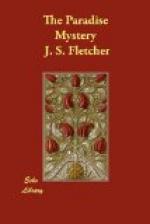“Give him time, Mitchington,” he said. “Pull yourself together,” he added, turning to the man. “Don’t be frightened; answer these questions!”
“For God’s sake, gentlemen!” grasped the verger. “What—what is it? What am I to answer? Before God, I’m as innocent as —as any of you—about Mr. Brake’s death! Upon my soul and honour I am!”
“You know all about it;” insisted Mitchington.
“Come, now, isn’t it true that you’re Flood, and that Folliot’s Wraye, the two men whose trick on him got Brake convicted years ago? Answer that!”
Flood looked from one side to the other. He was leaning against his tea-table, set in the middle of his tidy living room. From the hearth his kettle sent out a pleasant singing that sounded strangely in contrast with the grim situation.
“Yes, that’s true,” he said at last. “But in that affair I—I wasn’t the principal. I was only—only Wraye’s agent, as it were: I wasn’t responsible. And when Mr. Brake came here, when I met him that morning—”
He paused, still looking from one to another of his audience as if entreating their belief.
“As sure as I’m a living man, gentlemen!” he suddenly burst out, “I’d no willing hand in Mr. Brake’s death! I’ll tell you the exact truth; I’ll take my oath of it whenever you like. I’d have been thankful to tell, many a time, but for—for Wraye. He wouldn’t let me at first, and afterwards it got complicated. It was this way. That morning—when Mr. Brake was found dead—I had occasion to go up into that gallery under the clerestory. I suddenly came on him face to face. He recognized me. And—I’m telling you the solemn, absolute truth, gentlemen!—he’d no sooner recognized me than he attacked me, seizing me by the arm. I hadn’t recognized him at first, I did when he laid hold of me. I tried to shake him off, tried to quiet him; he struggled—I don’t know what he wanted to do—he began to cry out—it was a wonder he wasn’t heard in the church below, and he would have been only the organ was being played rather loudly. And in the struggle he slipped—it was just by that open doorway—and before I could do more than grasp at him, he shot through the opening and fell! It was sheer, pure accident, gentlemen! Upon my soul, I hadn’t the least intention of harming him.”
“And after that?” asked Mitchington, at the end of a brief silence.
“I saw Mr. Folliot—Wraye,” continued Flood. “Just afterwards, that was. I told him; he bade me keep silence until we saw how things went. Later he forced me to be silent. What could I do? As things were, Wraye could have disclaimed me—I shouldn’t have had a chance. So I held my tongue.”
“Now, then, Collishaw?” demanded Mitchington. “Give us the truth about that. Whatever the other was, that was murder!”
Flood lifted his hand and wiped away the perspiration that had gathered on his face.




